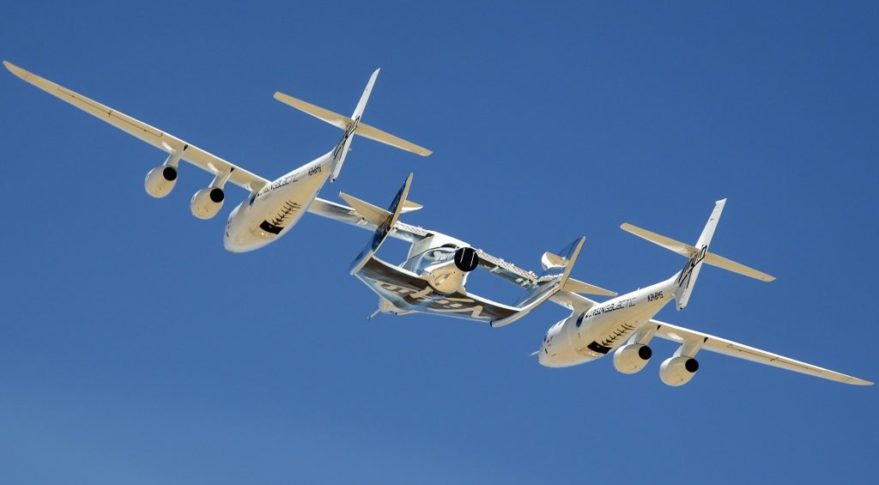Virgin Galactic Set to Begin SpaceShipTwo Glide Flights

NEW YORK — Virgin Galactic is planning to begin glide flight tests of its second SpaceShipTwo next Tuesday, almost exactly two years after a fatal test flight of its first suborbital spaceplane.
Virgin Galactic test pilot CJ Sturckow, speaking at a "Space Stories" event at The Explorers Club here Oct. 29, said the company has scheduled the first glide flight of the vehicle, named VSS Unity, on Nov. 1. That flight would come after a single "captive carry" test flight of the vehicle in September, when the vehicle remained attached to its WhiteKnightTwo carrier aircraft for its entire flight.
"It's ready to fly, and I'm really looking forward to seeing that," he said of SpaceShipTwo's upcoming glide flight.
That glide flight will be the first time VSS Unity has flown on its own, and will be the first in a series of glide flights before Virgin Galactic installs a hybrid rocket motor for powered flight tests. The glide test program will be shorter than for the first SpaceShipTwo since the second vehicle is very similar from an aerodynamics standpoint.
"As little as possible has changed," Sturckow said of the vehicle. "We're hoping to just spot-check the glide flight envelope and move quickly into powered flight testing." Those powered flight tests, he said, could begin early next year.
Sturckow added that SpaceShipTwo's hybrid rocket engine, which has gone through a long and troubled development at times, will be available when the vehicle is ready for those powered flight tests, having completed several full-duration burns. "I feel really good about our rocket motor now," he said. "When the spaceship is ready to go to space, the rocket motor will be, definitely."
A test flight on Nov. 1 would come two years and one day after the first SpaceShipTwo, VSS Enterprise, broke apart during a powered test flight, killing the vehicle's co-pilot and injuring the vehicle's pilot. An investigation led by the National Transportation Safety Board (NTSB) concluded that the co-pilot, Michael Alsbury, prematurely unlocked the vehicle's feathering system, allowing the tail to rise as the vehicle passed through Mach 1 and thus causing an aerodynamic breakup.
Get the Space.com Newsletter
Breaking space news, the latest updates on rocket launches, skywatching events and more!
"What the NTSB faulted Scaled Composites on was that a single pilot action could lead to the mishap," Sturckow said. Among the changes made to SpaceShipTwo was an "electronic inhibit" on the feathering system to prevent a pilot from prematurely unlocking it.
He added that inhibitor does have a manual override should the electronic system fail, allowing the pilots to still engage the feather. "That's sort of the best of all worlds. It's not a single action any more," he said.
One Virgin Galactic ticket holder, speaking later at The Explorer's Club event, said he was not deterred by the 2014 accident and subsequent delays. "It was like someone punching me in the stomach," said James Clash, recalling his response to news about the accident two years ago. He said he decided shortly afterwards to keep his ticket, confident the company would solve the problem and successfully fly. "My dream, as a Baby Boomer, is to go into space."
Clash said he paid a $20,000 deposit in 2010 for a ticket, then valued at $200,000. "I'm number 610 on the list," he said, and thus knows he won't fly for some time after Virgin Galactic does begin commercial SpaceShipTwo flights. "I think I'll fly by 2019."
This story was provided by SpaceNews, dedicated to covering all aspects of the space industry.
Join our Space Forums to keep talking space on the latest missions, night sky and more! And if you have a news tip, correction or comment, let us know at: community@space.com.

Jeff Foust is a Senior Staff Writer at SpaceNews, a space industry news magazine and website, where he writes about space policy, commercial spaceflight and other aerospace industry topics. Jeff has a Ph.D. in planetary sciences from the Massachusetts Institute of Technology and earned a bachelor's degree in geophysics and planetary science from the California Institute of Technology. You can see Jeff's latest projects by following him on Twitter.










